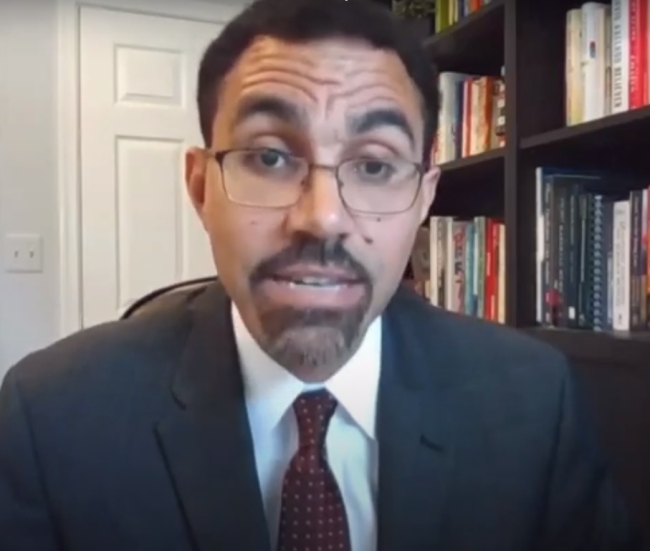You have /5 articles left.
Sign up for a free account or log in.

Former education secretary John B. King Jr. testifying Monday
U.S. House Education & Labor Committee
Amid concerns the coronavirus pandemic could worsen racial disparities, even as protests worldwide call for greater equity in the wake of the killing of George Floyd, former U.S. Education Secretary John B. King Jr. on Monday called for Congress to forgive some student debt and to double the award size of Pell Grants.
King, who headed the department for some of the Obama administration and is now president and CEO of the Education Trust, also backed the idea of institutions eliminating legacy preference in admitting the children of alumni, a practice that he said discriminates against students of color.
King’s testimony came during a wide-ranging three-and-a-half-hour hearing held by the House Education & Labor committee, which is controlled by Democrats. The hearing focused on the pandemic's worsening of racial disparities in the workplace, health care and education. Referring to K-12 education, the committee’s chairman, Representative Bobby Scott, a Democrat from Virginia, said a lack of access to computers and the internet amid the online pivot had widened the gap between low-income and minority students compared to whites.
Latino students and Black students, Scott said, are expected to lose nine and 10 months of learning, respectively, compared to six months for white students.
“A mountain of evidence has made it clear that, to effectively respond to the pandemic, we must address the widened existing racial inequities in education, the workforce and our health-care system,” Scott said.
Lawmakers, however, also worried that as the recession forces more students to leave or forgo college, existing disparities would worsen. Representative Alma Adams, a Democrat from North Carolina, noted that Brookings Institution studies show Black students are more likely to default on student loans than white students.
King agreed with that concern, noting that even among those with the highest income levels, Blacks borrowers even before the recession were seven times as likely as whites to default. He called for creating “limited and targeted” debt relief, as well as addressing the price of tuition that increases the amount students have to borrow.
“We need to make sure college is affordable to all students,” he said, noting that in 1980, Pell Grants covered 80 percent of tuition rates on average, but they only cover 28 percent now.
Noting that inequity issues are carrying greater urgency, King, testifying remotely, noted, “There are massive global protests against police violence seeking to ensure that ‘Black Lives Matter’ is more than just a hashtag.”
However, the hearings also come amid a partisan battle over Congress’s next coronavirus relief package. King backed the passage of the Democratic House’s $3 trillion HEROES Act, which includes $37 billion in additional aid for higher education, either going to states to disperse or directly to institutions. But Representative Tim Walberg, a Minnesota Republican, scoffed at the price tag, saying it was not a serious proposal.
Representative Susan Wild, a Pennsylvania Democrat, worried the pandemic would further widen the college completion gap between students of color and whites.
“I am deeply concerned that with the health pandemic that the small progress we’ve made increasing college completion will vanish,” she said.
King echoed the worry that low-income students and students of color “are more likely to be negatively impacted by loss of employment, changes in their family’s financial situation.” Increased funding and counseling had helped increase graduation rates at community colleges, he said.
King also agreed with Representative Susan David, a California Democrat, that the practice of granting preference to so-called legacy students, whose parents had attended a college, exacerbates racial disproportionality in college admissions. He said Johns Hopkins University’s decision to end the practice freed up space to admit more low-income students who receive Pell Grants.
King said being the child of a graduate increased an applicant's chance of being admitted by nearly half -- more than those who were not eligible for legacy admissions.
“It makes sense if universities are true to their commitment of a diverse student body to eliminate legacy admissions to really ensure that students of color are fully represented,” he said.
To change campus cultures so that students of color would be more comfortable, King also called on colleges to recruit a more diverse faculty and recruit more students from high schools that have large numbers of minority students.







